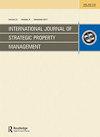调整战略智力和毕业生就业能力:一个概念回顾
IF 1.7
4区 管理学
Q3 MANAGEMENT
International Journal of Strategic Property Management
Pub Date : 2023-07-27
DOI:10.53819/81018102t4178
引用次数: 1
摘要
本文的目的是为学者进行符合国际出版标准的研究审查提供一个框架。概念化决定毕业生就业能力的因素以及它与战略情报的关系。通过三个主题提出了一系列命题,即:战略情报、职业咨询和技能差距。这主要是一篇概念性的论文,聚焦于执行系统评审的方法。然而,这篇论文建立在一个数据库的基础上,该数据库包含了先前在毕业生就业能力、职业发展和战略情报方面所做的研究。本文通过实证分析中的叙述性例子,进一步解释了从人力资本理论和适应性理论的理论框架中提取的概念框架的部分。该研究还提到了以前研究的具体发现,以展示框架的主要方面如何用于示范评论的总体趋势。本文的贡献在于强调培养学生的战略智力对于就业的重要性。这一概念框架的目的是提供有益的方法投入,以加强长期以来在毕业生就业能力和职业发展学科方面的努力,以更有条理和连贯的方式发展知识。研究表明,前瞻性和环境智能是战略智能的代理,当应用于职业咨询时,它们将通过与政府和行业的大学职业咨询合作,产生更适合能源需求和其他可持续绿色技术的新能力结果。调查还显示,当一名学生能够预测自己心仪行业的发展方向时,他或她就能培养出毕业后就业所需的技能。最后,研究发现,战略智能和毕业生就业能力的结合有助于提高招聘效果,并提高整个职业生态系统过程的效率。除了本科生之外,本文还为大学、毕业生和行业提出了一个实用框架,以帮助培养可就业的人才和企业家,以及在职业生态系统中保持可就业能力的一系列要求。本文通过整合战略情报和毕业生就业能力文献,认识到快速和持续学习以及远见的共同特征,从而为理论做出贡献。因此,本文有助于弥合各自研究议程的差距。因此,本研究的独特之处在于它对人力资本理论、毕业生就业能力和战略智力的发展做出了贡献。关键词:毕业生就业能力,战略智能,职业咨询,技能差距,可持续发展教育本文章由计算机程序翻译,如有差异,请以英文原文为准。
Aligning Strategic Intelligence and Graduate Employability: A Conceptual Review
The purpose of this paper is to present a framework for scholars carrying out reviews of research that meet international standards for publication. Conceptualizing the factors that determine graduate employability and how it relates to strategic intelligence. A set of propositions are presented using three themes namely: strategic intelligence, career counselling and skill gap. This is primarily a conceptual paper focusing on the approach of performing systematic reviews. Nevertheless, the paper builds on a database of previously done research in graduate employability, career development, and strategic intelligence. The paper uses narrative examples from empirical reviews to further explain the parts of the conceptual framework drawing from theoretical frameworks of human capital theory and adaptive theory. The study also alludes to specific findings from previous research to demonstrate general trends in how the framework's main aspects have been used in exemplary reviews. The contribution of this paper is to emphasize the importance of students developing strategic intelligence in order to be employable. It is intended that this conceptual framework would give helpful methodological input in enhancing long-standing efforts in graduate employability, and career development discipline to progress knowledge in a more methodical and coherent manner. The paper reveals that foresight and environmental intelligence are proxies for strategic intelligence and when applied to career counselling, they will result in new capacity outcomes that are more suitable to the energy requirements and other sustainable green technologies via university career counsel partnerships with government and industry. It also revealed that, when a student can predict the direction of their desired industry, he or she can develop the necessary skill sets to be employable after graduation. Finally, it found out that the alignment of strategic intelligence and graduate employability helps in recruitment effectiveness and improves efficiency in the entire career ecosystem processes. Apart from undergraduates, the paper proposes a practical framework for universities, graduates, and industry to help produce employable personnel and entrepreneurs, as well as a set of requirements for maintaining employability in a career ecosystem. The paper contributes to theory by integrating strategic intelligence and graduate employability literature by recognizing shared characteristics of fast and continuous learning, as well as foresight. Thus this paper helps to bridge the gaps in respective research agendas. As a result, this research is unique in that it contributes to the advancement of human capital theory, graduate employability, and strategic intelligence. Keywords: Graduate Employability, Strategic Intelligence, Career Counselling, Skill Gap, Education for Sustainable Development
求助全文
通过发布文献求助,成功后即可免费获取论文全文。
去求助
来源期刊
CiteScore
4.00
自引率
18.50%
发文量
23
审稿时长
15 weeks
期刊介绍:
International Journal of Strategic Property Management is a peer-reviewed, interdisciplinary journal which publishes original research papers. The journal provides a forum for discussion and debate relating to all areas of strategic property management. Topics include, but are not limited to, the following: asset management, facilities management, property policy, budgeting and financial controls, enhancing residential property value, marketing and leasing, risk management, real estate valuation and investment, innovations in residential management, housing finance, sustainability and housing development, applications, etc.

 求助内容:
求助内容: 应助结果提醒方式:
应助结果提醒方式:


